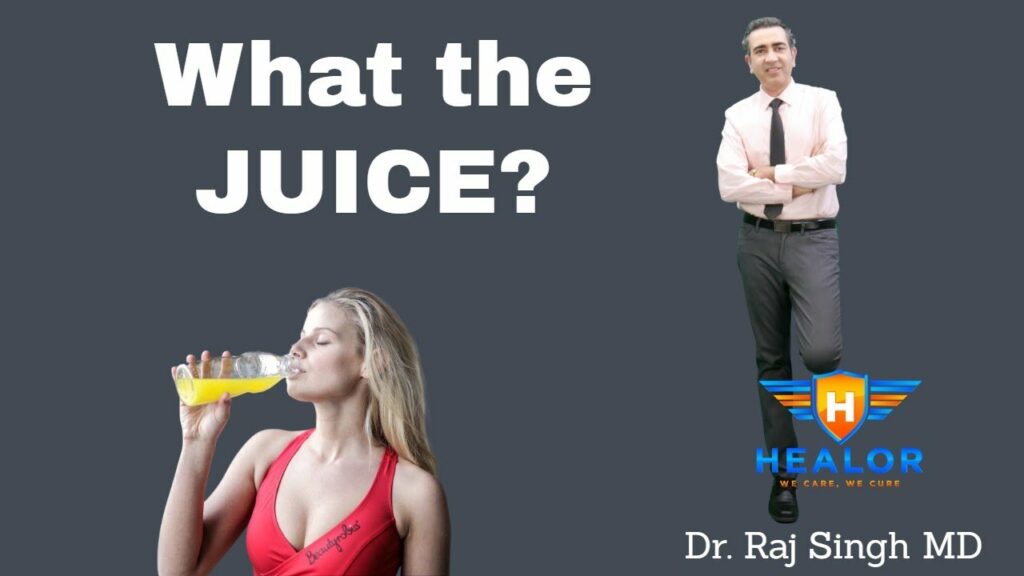
“Is juicing healthy?” I often get this question of whether drinking juices is good or a healthy alternative to soda. In this video, we are going to discuss everything there is to know about juicing.
Juicing has become increasingly popular and is often promoted as a healthy alternative to sodas and other sugary drinks.
When referring to Juicing I am primarily referring to fruit juices and not vegetable juices.
When it comes to juices it means 100% fruit juice, a smoothie, juicing done at home with a blender, cold-pressed juices, and everything in between.
Let’s start by looking at the benefits of Juicing:
- Juices are easy to digest for some individuals, especially after chemotherapy
- They are convenient drinks on the go for our busy lifestyle
- High concentration of nutrients and vitamins
- May help gain weight in someone who is malnourished
CONS:
- Fatty liver
- Diabetes risk
- Increased levels of Insulin
- Weight gain
- Increased risk of colon cancer by a reduction in fiber intake
- False sense of living a healthy lifestyle.
Eating fruits is generally considered healthy however drinking fruit juices and smoothies is not. So why is that?
- Let’s take the example of orange juice. A typical glass of orange juice has about 4 oranges. If I were to eat these 4 oranges I will need to peel them and slowly eat 1 slice at a time which would probably take 10-15 minutes. Because of this extra fiber and pulp, the food will stay in my stomach much longer and the fructose sugar will be slowly absorbed. Because of all of this extra fiber and pulp, my stomach is going to be stretched which will give me the sense of being full by stimulating stretch receptors such as GLP-1. When stimulated these receptors will slow the stomach so Food stays in the stomach longer and hunger is suppressed.
- In contrast, drinking the orange juice will take about 30 seconds to a minute, this juice will occupy a little space in my stomach and no stimulation of stretch receptors.
A commonly used medication for treating diabetes called trulicity works by stimulating GLP-1 receptors.
We have Built mechanisms to regulate hunger.
we have leptin, which is a hormone released by the fat cells and this suppresses hunger.
Insulin which is produced by our pancreas helps bring glucose levels to normal
Ghrelin you can remember by the sound Grrrr that our stomach makes when we are hungry, so in short Ghrelin makes us hungry
When the stomach is stretched by food leptin is released and when the stomach is empty Ghrelin is released.
The other important issue is that fructose which is a sugar found in fruits is not glucose. Fructose and glucose are very different in terms of their response to blood glucose levels.
Let’s talk a little bit about glucose and fructose.
fructose and glucose have the same number of calories. Lets take a look at this picture for the next couple of minutes
Glucose is what we get in table sugar. Table sugar is a blend of 50% glucose and fructose. Glucose is the primary source of energy for the cells and is directly used by cells.
Since glucose is quickly reabsorbed and quickly used glucose rarely converts into fat. Any leftover glucose is converted by the liver to glycogen which is stored in the muscle for future energy production.
Consumption of glucose also will cause a release of insulin and leptin which lets the body know that we are full and sugar levels drop and hunger subsides.
How about fructose? fructose is what we get in fruits and honey. The problem with fructose is that it cannot be used by the cells for energy directly. Fructose has to be broken down by the liver and converted into glucose and only then the cells can use it. Because it is not a readily available source of fuel, all of the fructose gets converted into a type of fat that we call triglycerides. This fat then gets deposited in the liver, which causes liver enlargement also referred to as fatty liver.
In addition, fructose metabolism produces uric acid which causes Gout and raises BP
Since fructose does not stimulate insulin release, blood sugar levels remained elevated for longer, and since no leptin is released we also stay hungry
What about DETOX:
How often do I hear this, I am doing juicing for detox
Grrrrrr
The human body is so complex, we have the kidney and liver to detox.
Drinking juice to remove toxins from the body absolutely makes no sense.
Let’s detox the body by not eating junk food, drinking plenty of water, and having a healthy fiber diet to regulate our bowels.
Take care of your gastrointestinal system, which means avoiding unnecessary antibiotics avoid taking over-the-counter medications like Tylenol and naproxen.
Limit eating meat and dairy products and have a more plant-based diet.
Avoiding juicing is especially important if you have a fatty liver or high triglyceride level.
So that’s it for today. I hope I was able to convince you to not rely on drinking juices too much. If you liked the content of this video please do like and subscribe.




